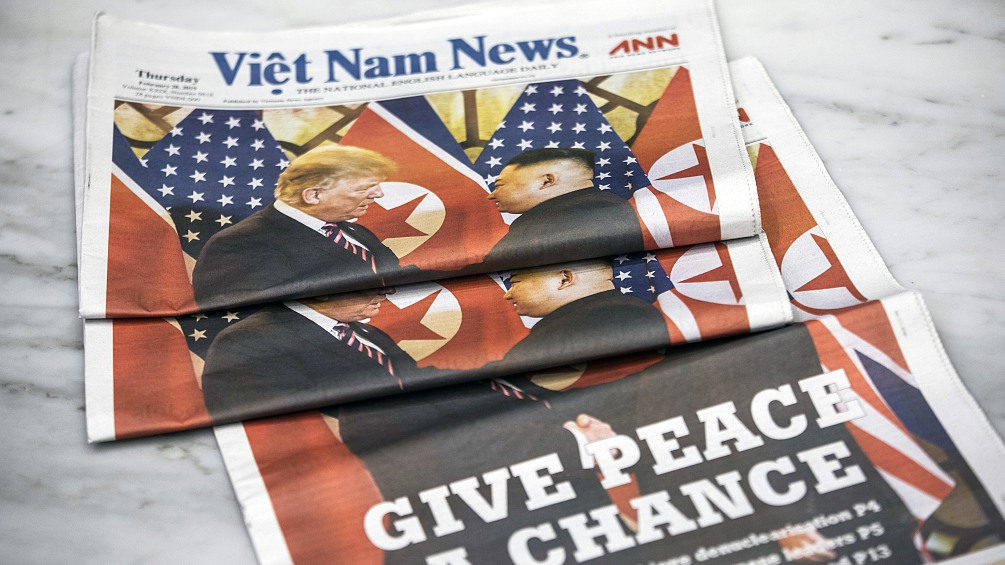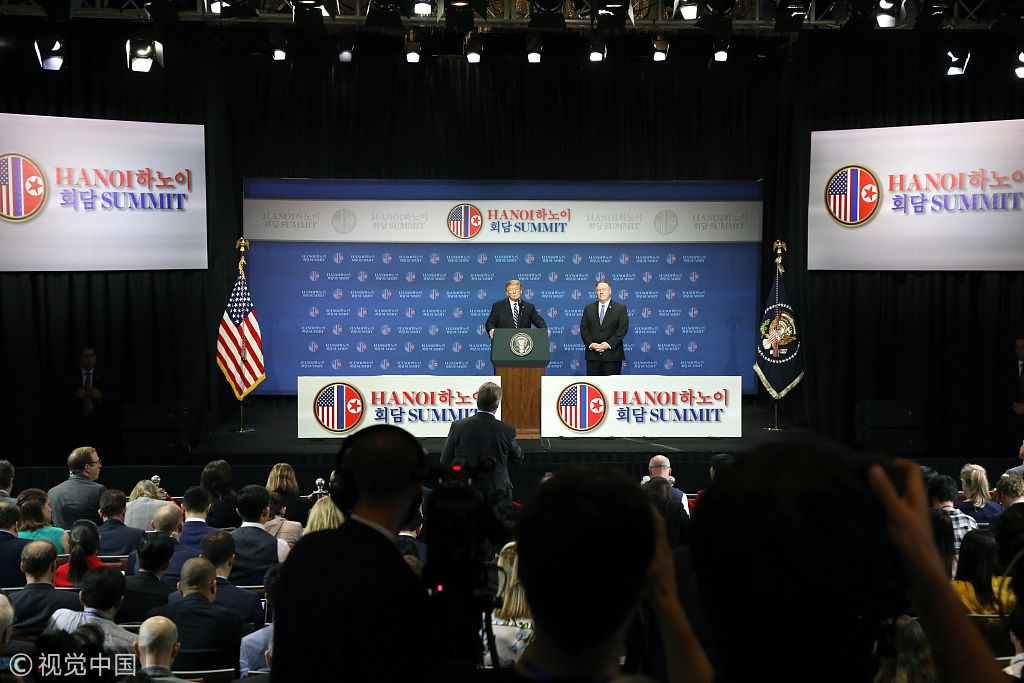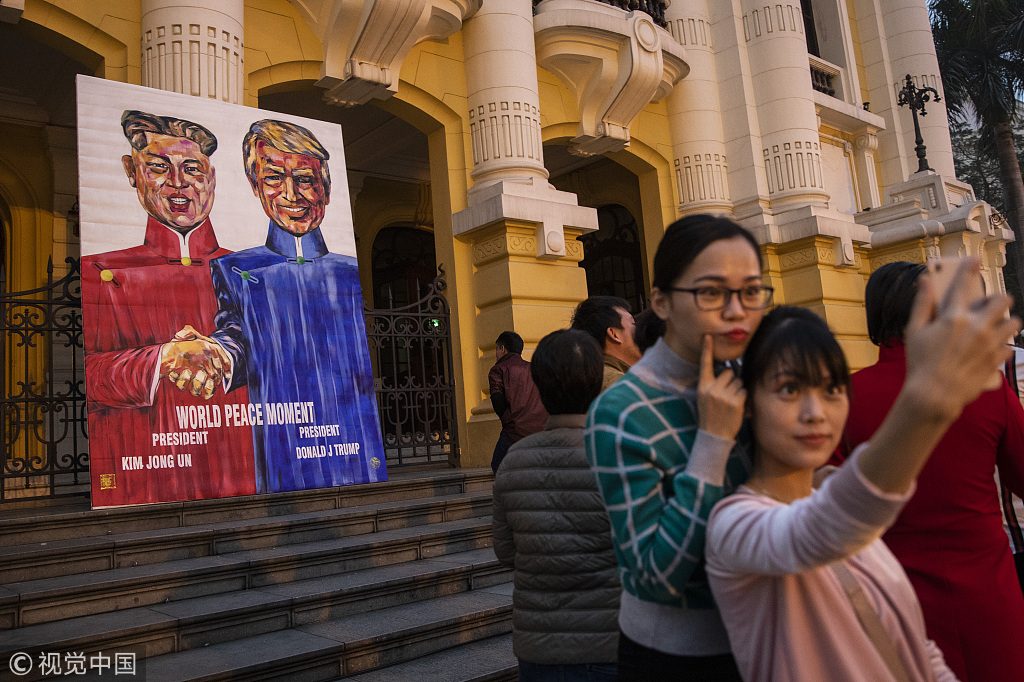
Opinion
10:12, 01-Mar-2019
No-deal Kim-Trump summit still encouraging
CGTN

Editor's Note: The following is an edited translation of a commentary from the Chinese-language "Commentaries on International Affairs" published on China Plus on March 1, 2019.
The second meeting between U.S. President Donald Trump and Democratic People's Republic of Korea leader Kim Jong Un ended earlier than scheduled in Hanoi without reaching any concrete agreement.
The U.S. side said there was a gap between them on entirely lifting sanctions against Pyongyang, but progress was made at the talks and the visions of the two sides are a lot closer than they were a year ago.
DPRK Foreign Minister Ri Yong Ho disputed the U.S. account, saying the country demanded only partial sanction relief in exchange for shuttering its main nuclear complex at Yongbyon, and that the discussions collapsed after the U.S. demanded further disarmament steps.

U.S. President Donald Trump, center left, speaks as Mike Pompeo, U.S. secretary of state, looks on during a news conference following the DPRK-U.S. Hanoi summit, February 28, 2019. /VCG Photo
U.S. President Donald Trump, center left, speaks as Mike Pompeo, U.S. secretary of state, looks on during a news conference following the DPRK-U.S. Hanoi summit, February 28, 2019. /VCG Photo
Ri says the DPRK was also ready to offer in writing a permanent halt of the country's nuclear and intercontinental ballistic missile tests.
Despite the fact that no deal came out of the meeting as expected, such a result is not the worst possible scenario. At their second summit, Kim Jong Un said that if he wasn't willing to denuclearize, he wouldn't be in Hanoi. Both Trump and Kim welcomed the suggestion to set up a liaison office in Pyongyang. These indicate that both sides have had a better understanding of each other's core issues of concern since the two leaders' first meeting in Singapore last June, which laid a solid foundation for further talks in future.
The Korean Peninsula nuclear issue has been going on for decades. It's unrealistic to hope that the problem will be completely resolved through one or two summits. The lack of trust and even hostility towards each other over the years can hardly be eliminated in the short term. The no-deal result of this meeting simply illustrates the complexity of the issue.

People pose for a selfie photograph with a picture of DPRK leader Kim Jong Un and U.S. President Donald Trump outside the Hanoi Opera House in Hanoi, Vietnam, February 28, 2019. /VCG Photo
People pose for a selfie photograph with a picture of DPRK leader Kim Jong Un and U.S. President Donald Trump outside the Hanoi Opera House in Hanoi, Vietnam, February 28, 2019. /VCG Photo
Pyongyang has deep concerns over national security. It's unrealistic to expect it to completely abandon nuclear weapons before the outside world provides security guarantees.
But it's encouraging to see that the DPRK has sent out a clear signal to the international community that Pyongyang is ready to resolve the nuclear issue and shift its focus to domestic economic development. Since the end of 2017, the DPRK has not conducted any missile or nuclear weapons tests. This has not only laid the foundation for negotiations between the two countries but has also marked important progress worthy of recognition.
From hostilities towards each other to handshakes between the two leaders, the transition suggests that negotiation is the only right way to solve the Korean Peninsula nuclear issue, as pointed out by Chinese State Councilor and Foreign Minister Wang Yi when he met with DPRK Vice Foreign Minister Ri Kil Song in Beijing shortly after the second Kim-Trump summit. Wang Yi also called on Pyongyang and Washington to maintain patience, continue their dialogue, and meet each other halfway, adding that China is willing to continue playing a constructive role in this regard.
As expectations for meetings between the two leaders continue to increase in the region, the international community should give full support to and encourage Pyongyang and Washington to continue along the track of peaceful dialogue and negotiations so that the nuclear issue on the Korean Peninsula can be solved step-by-step and lasting peace and prosperity realized in Northeast Asia.
(If you want to contribute and have specific expertise, please contact us at opinions@cgtn.com.)

SITEMAP
Copyright © 2018 CGTN. Beijing ICP prepared NO.16065310-3
Copyright © 2018 CGTN. Beijing ICP prepared NO.16065310-3